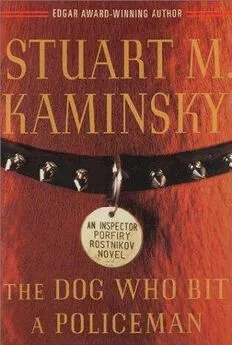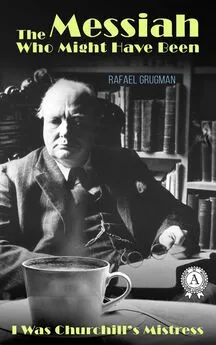Stuart Kaminsky - The Dog Who Bit a Policeman
- Название:The Dog Who Bit a Policeman
- Автор:
- Жанр:
- Издательство:неизвестно
- Год:неизвестен
- ISBN:нет данных
- Рейтинг:
- Избранное:Добавить в избранное
-
Отзывы:
-
Ваша оценка:
Stuart Kaminsky - The Dog Who Bit a Policeman краткое содержание
The Dog Who Bit a Policeman - читать онлайн бесплатно полную версию (весь текст целиком)
Интервал:
Закладка:
Anna found the young woman very interesting.
It was late.
Lydia Tkach had knocked insistently and Anna had admitted her, perhaps feeling a slight touch of loneliness that she did not want to admit to herself. Lydia had entered wearing a heavy blue man’s robe at least a size too large for her. Anna had returned to her chair and puzzle, and Lydia had closed the door and moved to sit across from her.
“Have you heard from Elena?” asked Lydia.
“No. I didn’t expect to.”
“She could be dead,” said Lydia.
“Thank you for coming late in the night to cheer up a woman with a heart condition,” said Anna, not looking up from her puzzle.
“Are you being sarcastic, Anna Timofeyeva?”
“Yes, Lydia Tkach.”
“I did not think such sarcasm was in you.”
“I have, since my retirement, nurtured and developed it with great care. Soon I will be able to reduce all but the most oblivious or determined-and that includes you-to frustration and departure.”
“More sarcasm. You play games with words and pieces of cardboard and I am sick, sick with fear about my only son,” said Lydia, pressing her fists into her frail chest.
“That is understandable,” said Anna, finding a place for a piece of the puzzle that had eluded her.
Bakunin, who did not like Lydia, had cautiously leapt back into Anna’s lap, eyes fixed on the loud intruder.
“My Sasha is a brooding, reckless young man. He has a family, children, a wife who is growing weary of his frequent absences, long hours, and. . his rare indiscretions caused by the pressures of his work.”
“And he has a mother,” said Anna, examining a small puzzle piece that may have been part of a human face.
“He has a mother,” Lydia said, reaching for a puzzle piece near her hand.
Anna considered taking the piece from the woman and remind-ing her that she was in violation of the agreement they had made when Lydia had moved into the building. Lydia was to come when invited, to keep her visits brief, and to engage in no complaints about her son, his family, or the simple dangers of being alive.
Lydia had begun violating the agreement within a week of moving in. Reminders had been of no use. Anna had even taken the extreme step at one point of informing Lydia that she could not visit under any circumstances until further notice. This had been successful for almost two days.
Lydia reached over and placed the piece of the puzzle snugly into the proper space.
It was not a question of the quality of Lydia’s work. The woman obviously had an almost eerie ability to do the puzzles without even thinking about them. But Anna’s goal was not to race through each and hurry to the next. Anna had a great deal of time. She wanted the satisfaction of completing each puzzle by herself.
Anna put down the piece in her hand and gently took the piece Lydia was now holding.
“I cannot talk to Porfiry Petrovich about this,” said Anna. “I do not wish to talk to him. It is not my business. I would not even talk to him about Elena.”
“Maybe I could talk to the new director, Yockvolvy?”
“Yaklovev,” Anna corrected. “I doubt, from what I know about him, that he would be sympathetic to your pleas.”
“Can it hurt?”
Anna shrugged. Actually, it could hurt, but there was something satisfying to the imagination to picture Lydia loudly insisting to the Yak that he find safe work for her son, even if Sasha didn’t want it. However, it could certainly do Sasha’s fragile career no good.
“So,” said Lydia. “You will do nothing?”
“Nothing,” said Anna, stroking her cat. “There is nothing I can do, nothing I wish to do.”
“Well, a mother can do a great deal,” said Lydia.
“I wish you luck, Lydia Tkach. Now, I am afraid I will have to ask you to leave me. I need to go to bed.”
Lydia stood up, pulled the robe tightly around her, and said,
“Sometimes I think you lack normal feelings, Anna Timofeyeva.”
“Sometimes I agree with you, Lydia Tkach, but that seems to be gradually changing and I am not sure I welcome the change. Please forgive me if I do not rise. I’ll lock the door behind you in a few minutes.”
Lydia walked to the door and opened it. “We’ll talk further tomorrow,” she said.
“I will try to contain my great enthusiasm for the moment of that conversation.”
“More sarcasm,” said Lydia. “You are a difficult person to have as a best friend.”
“Best friend? I did not apply for that distinguished position.”
“It evolved,” said Lydia, leaving the apartment and closing the door behind her.
Could it be, thought Anna, that if I were under oath I would have to admit that Lydia is my best friend? The thought was depressing. “ Chiyigh, tea and bed,” she said. “Sound good to you, cat?”
Baku did not respond. Anna rose from her chair, careful not to jar the table. After the first time Anna had risen in the morning and found that Baku had destroyed her puzzle, Anna had chastised the cat whenever he approached the fragile table. He had learned quickly. But the mind of a cat is unpredictable in its workings.
Anna took Baku into the bedroom with her every night and closed the door. Baku had no problem with this and slept comfortably by Anna’s side.
Anna Timofeyeva had always been honest with herself and, when possible, with others. Now, as she prepared water for tea after locking the apartment door, she admitted that she was keeping Baku next to her at night because she wanted, needed, the company of a living creature.
In one sense, Anna, who had suffered three heart attacks, was waiting for the fatal one, waiting to die. But in another sense, Anna had come to terms with her life. She missed the satisfaction of power and mission she had when she had been a procurator, but she had grown quite comfortable with her present life. In fact, even if she were suddenly cured, she doubted if she would be interested in returning to work, though she was only fifty-five years old. She had been a loyal, hopeful Communist, well aware of the abuses of the system and the principles of the revolution, but she had doggedly pursued her duties.
The water was boiling now. Anna, who stood next to the stove, turned off the flame and poured the steaming water into her large glass, which contained an English tea bag.
Since she was an atheist, Anna did not pray as she stood drinking her tea, but she did close her eyes and will that Elena would be all right. It struck her that she suddenly knew how the many wives and mothers of police officers felt each night, the fear, the attempts not to think about what might happen.
She finished the tea, threw the bag in the garbage, rinsed the glass and said, “To bed, Baku. Tomorrow we have a satisfying and meaninglessly busy day before us, and, if we are fortunate, Elena will be home.”
Chapter Eight
“No,” said the woman with her head bowed, wearing a dark veil to cover her eyes and hide her face.
Fortunately, the veil was appropriate since it was a funeral and other women present also had their faces covered.
The crowd around the grave site was large and dangerous. Rostnikov had hoped but not expected that it might rain, which might cut the burial short and lessen the possibility of conflict in the cemetery. But the morning was pleasantly cool, and the sky, while cloudy, gave no sign of an immediate shower.
To the right of the temporary headstone-a ten-foot dark stone with a life-size image of Lashkovich in a leather jacket was being prepared-gathered the one-eyed Casmir Chenko and his Tatar Mafia. To the right stood Shatalov and the Chechin Mafia. Both gangs were dressed in dark suits. Four uniformed policemen from the special gang force stood a discreet distance away at the foot of the grave where the casket was now being lowered. The police were armed with automatic weapons, which two of them had put aside before the burial service began so they could search the incoming members of the two Mafias for weapons. They had found none.
This section of the cemetery was a ghostly army of tall, black gravestones etched with the likelinesses of dead young men in leather who looked down like an army of the damned.
“You are certain,” said Rostnikov, who stood on one side of the veiled woman. Emil Karpo stood on the other.
“The man who was with Mr. Lashkovich is not here,” Raisa Munyakinova said. “I would like to leave.”
“Just a while longer,” Porfiry Petrovich said gently.
The service was being conducted by a tall man somewhere in his fifties. He wore a white gown and, before the lowering of the casket began, he had spoken in an unfamiliar language, his deep voice filled with emotion.
“He said,” Karpo whispered, “that a good man was being buried today, a man who treated his elders with respect, his wife and children with love, and his country, Tataria, with pride. We shall miss him.”
Rostnikov knew that the man being lowered into the ground must have treated his elders, since they included Casmir Chenko, with respect because he had little choice. Lashkovich, however, had abandoned his wife and teenage son five years earlier and never sent them a penny. The widow lived in Kazan, five hundred miles from Moscow, in what had been declared the Tatar capital. The widow lived by working in a belt factory. She was not present. As for his patriotism, a quick search had revealed that the dead man had paid no taxes. It might also be considered a less than chauvinistic act to murder citizens, as the dead man had made a career of doing.
“Look again, Raisa Munyakinova, please,” said Rostnikov, well under the voice of the man in the white gown who shifted in Russian to an almost tearful prayer.
“May God take the soul of this good man into his arms. May he receive in heaven all that he deserves for a life well spent in devotion and toil.”
“Amen to that,” said Rostnikov.
“I want to go now,” Raisa said. “I’m tired. I’m afraid.”
“One last look,” said Rostnikov, incredibly uncomfortable and trying to bear the brunt of the weight of his body with his good right leg, using the left one to simply maintain his balance.
She lifted her veil just enough to see out from under it and scanned the crowd once again.
“No,” she said, letting the veil drop. “He is not here. I am sure.”
Raisa had worked a full shift and it had been a difficult one. The Carpathian Bathhouse was nowhere near as well-maintained as the hotel health club where she had worked the night before and where the Tatar had died. She had expected another cleaning woman, Olga Sachnova, but the other woman had simply not shown up.
There had been debris and wet towels. The sinks and toilets weren’t filthy but they were not clean. She had put in an extra hour, though she would never be paid for it. She did not wish to lose her job, and she could not possibly bring herself to leave any sign of dirt behind her.
From the bathhouse, she had caught a bus and made it to Petrovka at the time designated for her meeting with the pale detective named Karpo. She had passed the police building hundreds of times and heard tales about the dark bowels of the building. Raisa did not want to enter, but she could not refuse. The guard at the gate had taken her name and made a call. Moments later Karpo had appeared and led her into the building for a nearly two-hour examination of the photographs of not only Chechin gangsters, but Tatars, Afghan veteran Mafia members, and dozens of Georgians, Moslems, Ukrainians, Estonians, and Russians of all ages. Nothing.
The casket was now resting on the dirt bottom of the grave and three Tatars were shoveling soil over it. The man in the white gown made a motion with his raised hand and the burial was over.
Читать дальшеИнтервал:
Закладка:










